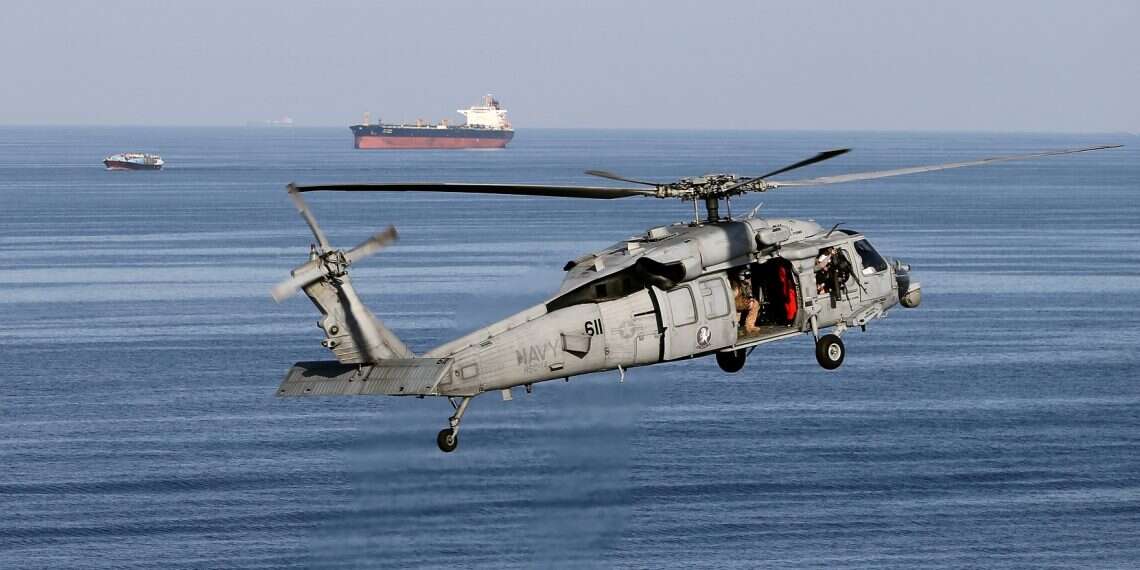Iran’s top priority is to preserve the rule of the ayatollahs, so if the U.S. is prepared to back threats with military action, it will agree to a better nuclear deal from President Trump.
Col. (res.) Ronen Itsik, ISRAEL HAYOM

An MH-60S helicopter hovers in the air with an oil tanker in the background as the USS John C. Stennis makes its way to the Gulf through the Strait of Hormuz, last December | Photo: REUTERS/Hamad I Mohammed/File Photo
The developing tension between the U.S. and Iran in the Persian Gulf comes as no coincidence. Since U.S. President Donald Trump pulled out of the 2015 nuclear deal and restored sanctions against Iran, he has had a clear goal in mind – to topple the ayatollah regime and dismantle the axis of evil.
Last decade, former President George W. Bush declared the ties between the nations of the Fertile Crescent an “axis of evil.” Later on, after the 9/11 attacks, he took action to smash that axis, which included striking a fatal blow to al-Qaida and the Taliban; bringing down the regime of former Iraqi dictator Saddam Hussein; and because of the U.S.’s incorrect approach to creating stability after the Iraqi Baath regime fell apart, it all stopped there.
The result was that the American economy took a serious hit because of the defeat in the war in Iraq and a mistaken strategy to stabilize the region. In effect, it all created a vacuum, which the Iranians and the Islamic State filled. Former U.S. President Barack Obama, who succeeded Bush Jr., inherited the problem and took a conciliatory approach to these threats that resulted in a major loss of standing for the U.S. It’s no secret that Trump was elected president because the Americans were reacting to Obama.
Trump is the first American president who has adopted violent, uncompromising rhetoric on the axis of evil. He announced his intention to wipe out ISIS, and even sent an unmistakable message to the Iranians: Don’t mess with America, because we can annihilate you. This is not an empty threat.
In the last two years, Trump has put together a particularly belligerent cabinet, headed by Secretary of State Mike Pompeo and John Bolton as national security adviser. Neither of these “hawks” blink in the face of terrorism, and now that America is moving forces to the Persian Gulf, talk is starting to be bolstered by action. The Americans expect the Iranians to make an absolute retreat from their nuclear program, but this time they are including Al-Quds Force – which is behind terrorism throughout the region, not to mention the world – in the equation.
America will not be deterred from war with Iran. What’s more, the Americans understand that the ultimate goal of the Islamic Republic regime is to safeguard the revolution – in other words, that the survival of the rule of the ayatollahs is more important to it than anything. When they (Ali Khamenei and his evil friends) realize that their survival is in real danger, they will be forced to cave. This is precisely the policy that Obama was unwilling to entertain. He didn’t understand that an ultimatum for the Iranians must be backed by a genuine military option.
Trump won’t be put off. Certainly not when he is a year and a half out from an election for a second term. There’s no doubt that the balance of power is inherently asymmetric. American can wipe out the ayatollah regime just like it did Saddam Hussein in Iraq, and Tehran knows that very well. At the end of the day, the evil regime must vanish from the face of the earth, and it would fit Trump, who promised to make America great again, to be the liberator.
However, Trump’s capitalistic worldview would prefer a better nuclear deal with Iran, which he is keeping in reserve as a way out of the crisis. He’ll offer the Iranians the deal of a lifetime, and if they are under real threat of destruction, they won’t have any choice but to accept it. That is how America is implementing the strategy of “mutually assured destruction,” which has prevailed since World War II. It is saying: If you don’t do what we ask, you’ll be annihilated. America, the only superpower in the world, is reassuming its role as policeman, a role that Obama did everything he could to escape.
The importance of the situation cannot be exaggerated, insofar as it relates to Israel. Israeli and U.S. interests are aligned. However, it’s clear to the intelligence community that if it comes to war in the Gulf, Iran will respond, mostly by using Hezbollah and its 200,000 missiles to create deterrence. If Tehran is attacked, the missiles will no doubt be let loose on Israel.
It is still too early to build scenarios, but if it comes to war, the Israeli homefront will likely endure some harsh blows. The good news is that if America chooses the military option, Lebanon will probably calculate its odds early on. Without the backing of the ayatollahs, Hezbollah will disappear, and Hezbollah leader Sheikh Hassan Nasrallah will face a clear choice about whether or not to go all in.
The Iranians, meanwhile, face another choice – to be or not to be.



“As Trump escalates pressure, experts fear Iran will strike back. ” See this important article in Yahoo News.https://www.yahoo.com/news/as-trump-escalates-pressure-experts-fear-iran-will-strike-back-133314753.html